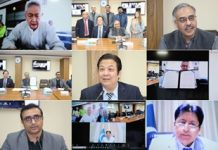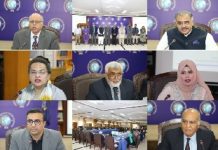Pakistan enthusiastically participates in all regional cooperation initiatives led by China whether they are strategically important or economically crucial, such as the Shanghai Cooperation Organization and the Boao Forum for Asia (BFA). Equated by some with the World Economic Forum in Davos, Switzerland, the latest BFA just concluded in South China’s Hainan Province.
Prime Minister of Pakistan Mian Muhammad Nawaz Sharif delivered a plenary speech titled “Reviving the Silk Road.” The forum reflects the major contours of the Asian Century under the dynamic leadership of a rising China. Chinese technology and competitiveness are significantly increasing and are influencing other Asian economies. Sharif opined that “the revival of the Silk Road can help in bringing economic growth and prosperity in the region.”
Last year, Chinese economic growth was 7.7 percent. As Asian economies have kept rising, the BFA has sustained its momentum in the last 14 years. It appears that the future economic solutions of Asia will be found within the BFA, making it vital to understand its future role.
Since its inception in 2001, the non-governmental BFA has become an important source of contact between the Chinese government, businessmen, economists, academics, and media personnel.
China, Japan, Australia, and the Philippines were among the founding members of the BFA. The forum also provides an opportunity for Asian nations to reduce tension and forge closer ties as they meet and exchange views.
This year’s session was themed at “Asia’s New Future: Identifying New Growth Drivers.” Chinese Premier Li Keqiang rightly warned that “no Asian countries can achieve development in isolation from each other.”
Throwing light on South Asian development, he pointed out that “South Asian countries have experienced economic slowdown, rising inflation, and even capital flight, and currency depreciation.” Intra-Asia regional trade has increased to $3 trillion but this was far less, Li mentioned.
China’s approach to regional initiatives in Asia is comprehensive, and it wishes to uplift the fate of the entire Asian continent by specifically eradicating poverty which affects over 700 million people. China also supports many other regional and global economic blocs and initiatives seeking to convert the vast Asian continent into a well-integrated Asian Community.
The negotiations on the Regional Comprehensive Economic Partnership (RCEP) would solve many of Asia’s economic woes. China is in the driving seat in the process of the creation of the RCEP and hopes that agreement would reach next year. China is also supportive of the Free Trade Area of the Asia-Pacific and the Trans-Pacific Partnership.
Besides, “China is ready to work with countries involved to draw up plans for building the Bangladesh-China-India-Myanmar Economic Corridor, and the China-Pakistan Economic Corridor, and upgrade the China-ASEAN FTA,” according to Li.
While addressing the opening plenary session of the BFA, Li mentioned the vitality and usefulness of all these initiatives. He also proposed the establishment of the Asian Infrastructure Investment Bank as an financial arrangement to implement many of these mega projects under these various regional economic initiatives.
The Chinese private sector has been taking a keen interest in investment in Pakistan under the China-Pakistan Economic Corridor program driven by leaders on both sides. So far $52 billion have been pledged for many of these infrastructural projects, with $32 billion for energy alone in the next five years.
If this happens, Pakistan will become one of the largest recipients of Chinese outbound investment. With the fast rising optimistic outlook of the Pakistani economy in the past 10 months, the future of Sino-Pakistani economic relations appears quite bright.
Views expressed are of the author and do not necessarily reflect the views of ISS or of the Government of Pakistan.













